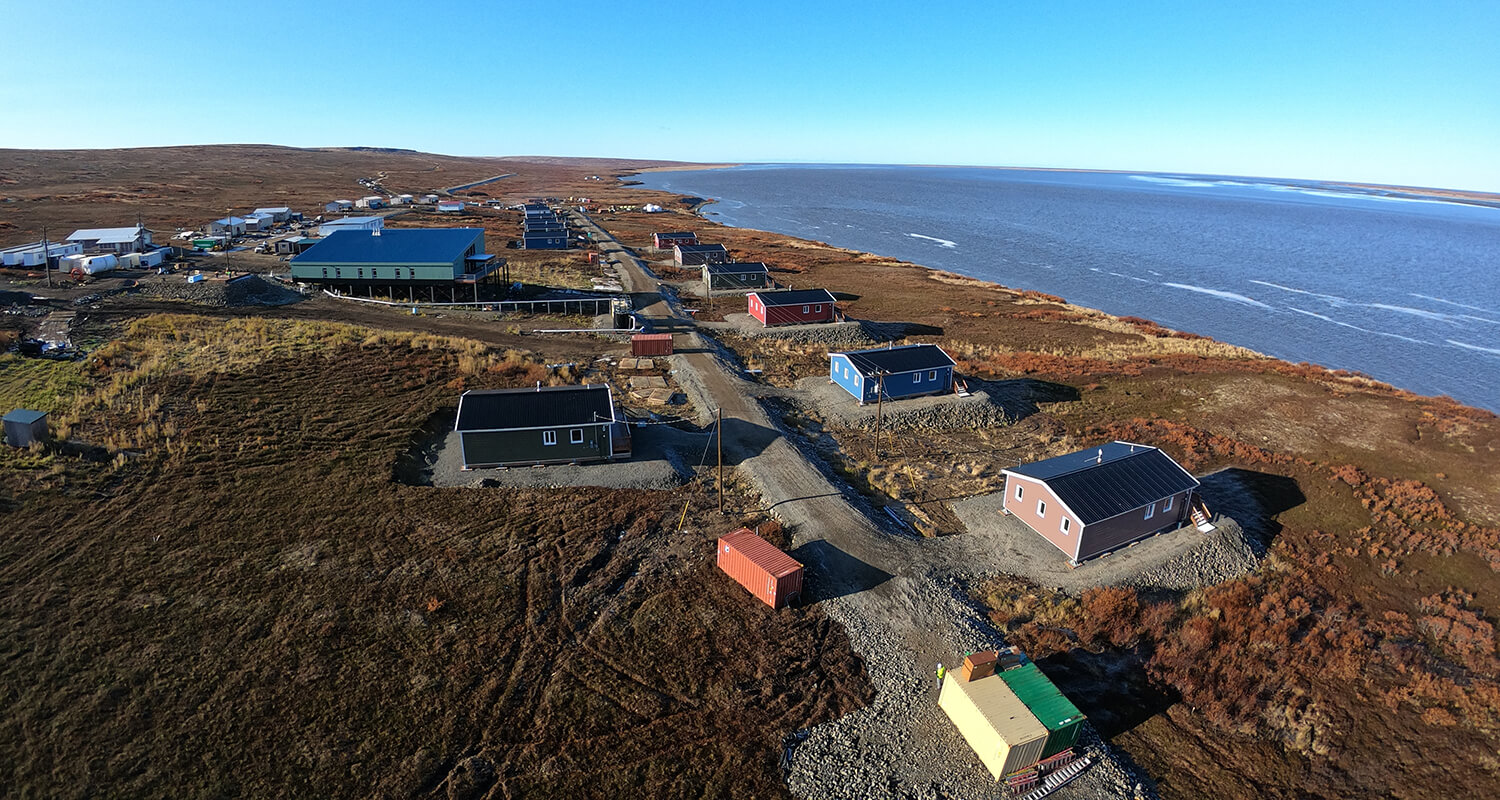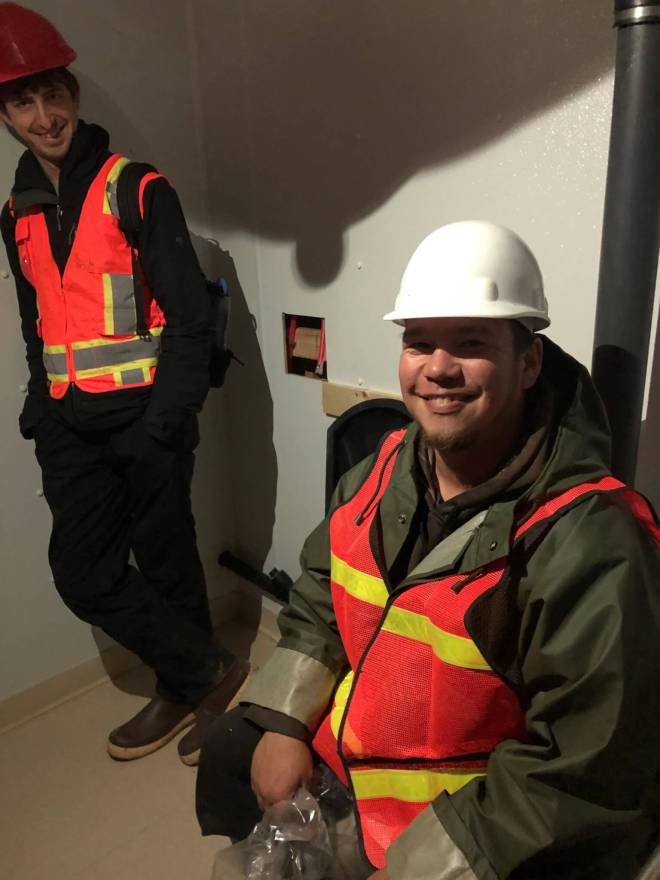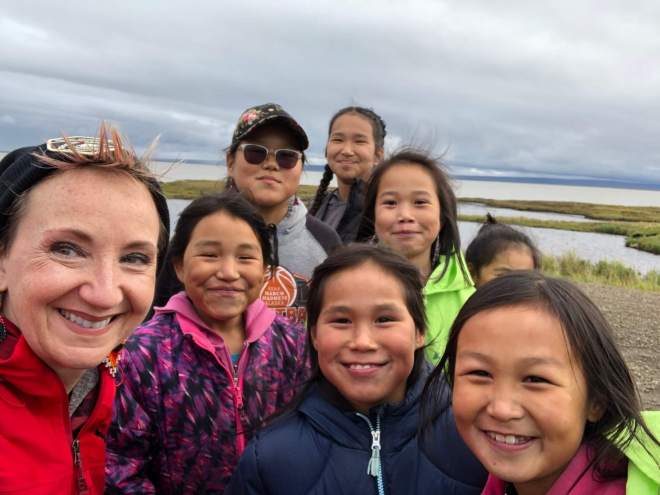UMCOR provides home sanitation units for Alaska’s Yu’pik community as first residents relocate to Mertarvik

By Christie R. House
December 13, 2019 | ATLANTA
The United Methodist Committee of Relief’s partnership with the Alaska Native Tribal Health Consortium and the National Tribal Water Center to provide Portable Alternative Sanitation Systems for the Newtok, Alaska, community has made good progress this year. Newtok is a Yu’pik village that has lost much of its land and some houses to rising sea levels and eroding coastline. The whole community is moving in stages to Mertarvik, Alaska, further inland on the Ninglick River, yet still within the territory their ancestors knew as a summer home.
UMCOR – through its Water, Sanitation, and Hygiene or WASH program – has provided the in-home sanitation systems for 21 new homes completed in Mertarvik this year. The PASS units installed use seven components that create a self-contained and sustained waste and water system in each housing unit. The system is a cost-effective solution for the sanitation needs of Alaska’s remote, indigenous communities. Meanwhile, back in Newtok, residents are still using a honey bucket system, meaning residents haul out their own waste water, raising health risks for the community.

A first look at Mertarvik
Lorrie King, UMCOR’s director of Sustainable Development, recently visited the two communities, old and new, to assess the progress. She met with the Native Alaskan leaders who coordinate the relocation project. It has taken decades to develop plans and secure property, permissions and funding to build a new community from the ground up.
“Seeing the erosion of Newtok up-close was gut-wrenching,” King admitted. “When I visited Newtok, we slept in the school. It was the only place in the village that had running water, flush toilets and showers.
“Community members have to shower on alternate days; that’s the water situation in Newtok. You walk out across what used to be frozen tundra, soaked with seawater and human waste. It’s an unhealthy environment. Everyone, especially the children, have battled respiratory viruses.”
King was transported by boat to Mertarvik by one of the tribal administrators, Andrew John, a former U.S. marine. This trip was King’s first look at the new community and the PASS installation in the new houses.
“It’s the difference between night and day,” she explained. “You see the new beautiful houses and the PASS units in every house. That’s life changing for the residents.”
Learning new practices while reclaiming cultural heritage

In keeping with tribal customs and the best WASH practices, Newtok’s residents are invited to learn about the sanitation systems in the houses of their new community well before they make the move to Mertarvik. James Temte, founding project manager of the National Tribal Water Center’s Water for Life Project, helped to develop the water and sanitation health curriculum used by the Newtok Tribal Council.
Temte, a member of the North Cheyenne Nation, felt that a WASH educational tool could also preserve traditional culture and pass on traditional knowledge. The resulting Water for Life program includes the community from the beginning and celebrates their ideas, culture and traditional values about water.
“Behind the scenes, community members are visioning,” Temte explained. “They share their stories. We include all the elders in the Water for Life meetings, and traditional leaders, like medicine men, or respected elders. Here, they have space and time to talk about their culture. In addition, we do side art projects with youth on how to express traditional water stories and culture in artwork they develop.”
For children as well as adults, relocation has been traumatic. In September, King attended a Water for Life event in Newtok’s school. This special community event was designed to lessen the trauma. Professional playwright, Ty Defoe (Ojibwe, Oneida), currently working in New York City on a play, and Lance Twitchell (Alaska Tlingit) who just completed a Ph.D. in tribal culture, helped the children and youth of Newtok create a theatre production. Everyone had great fun, and the kids did a great job, according to King.
“We hope to spur conversations, and we brought a behavioral health specialist, in case people needed to talk further about the impact of this move,” said Temte.
King and Marleah Makpiaq LaBelle, another project manager for the National Tribal Water Center, noted that Newtok had gained the support of people from different sectors of the Native American empowerment movement. “It was gratifying to see Lance and Ty take time from their work to devote energy to this project,” King said. “Marleah said you could almost see the Newtok kids develop more confidence throughout the process of creating, rehearsing and performing the play.”
The first group of people has now relocated to Mertarvik. King confirms that UMCOR will continue to invest in this community.
Christie R. House is the senior writer and editor for Global Ministries.

